Allan Border, Brett Lee and Adam Gilchrist explain how to win a Cricket World Cup
Allan Border, Adam Gilchrist and Brett Lee explain the method behind taking on the world and winning (spoiler alert: having an Australian passport is a valuable first step).
Cricket
Don't miss out on the headlines from Cricket. Followed categories will be added to My News.
- Murder of a cricket coach that never was
- Most bizarre innings in World Cup history
- Rhodes: the photo that changed my life
- Leverock and the catch that shook the world
Aaron Finch rates England and India a better chance than Australia to win this year’s World Cup.
In public at least.
Speaking at the captain’s day ahead of Australia’s warm-up win over the English, the skipper was asked who the favourites were and didn’t hesitate in identifying the hosts and Virat Kohli’s side.
Such pronouncements are made for wider consumption, of course. The diplomatic thing to say.
Behind the scenes Finch will be quietly confident that Australia can go all the way.
Why wouldn’t he? No other nation comes close to matching Australia’s record of five wins from seven finals in 11 previous tournaments. The squad, as ever, travels in expectation rather than hope.
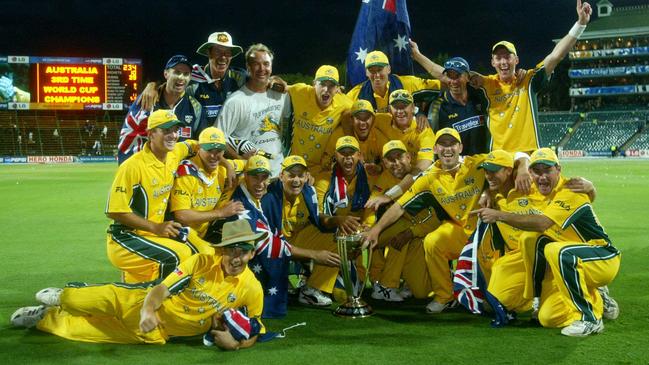
“We just know how to win World Cups,” says Brett Lee, Australia’s leading wicket taker in the undefeated 2003 campaign.
“It doesn’t necessarily give us a golden ticket to the final; we have to work bloody hard to get there. But because we understand how to win, that will definitely help in those big play-off moments.”
GLENN MAXWELL: Aussies’ star turn primed for another big show
JOS BUTTLER: England’s power-hitter playing in a different gear
RASHID KHAN: The pain inspiring Afghan leggie to World Cup glory
Just six months ago Australia’s ODI form was in the gutter — four wins from 26 matches by the midpoint of their series in India.
An incredible comeback from 2-0 down and a stroll against Pakistan in UAE, as well as the return of Steve Smith and David Warner, has fuelled the widely held belief that Australia is once more peaking at the right time.
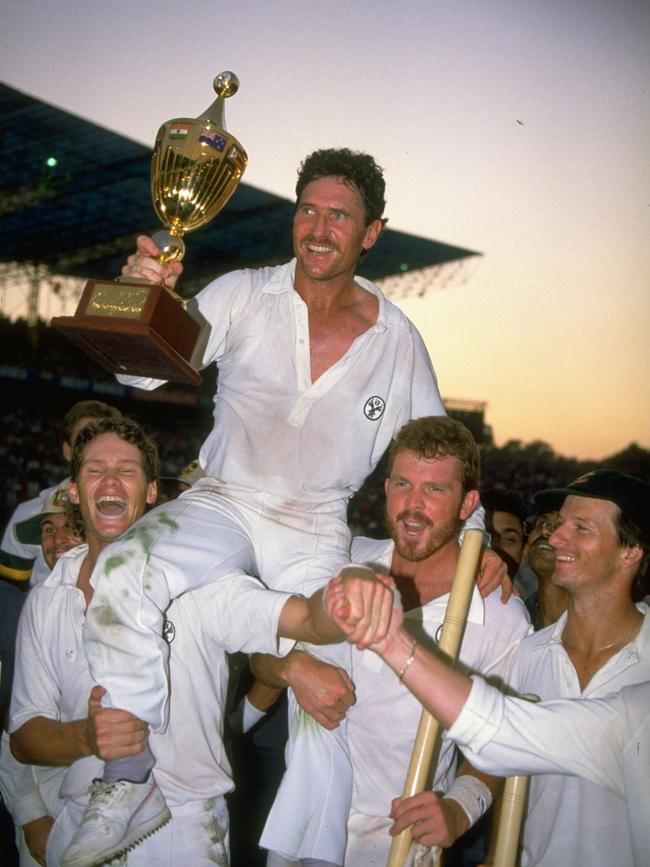
“It [only] comes round every four years so everyone is up for it. You might only get to play one,” says Allan Border, the first Australian to lift the World Cup, back in 1987.
“I know the same is true for all the other sides but I think we really look at it as a special moment.
“And we generally have good enough talent on the field to get the job done.”
Great players form great teams. And Australia’s World Cup history is decorated with big game performers standing up when it matters.
The mind easily recalls Ricky Ponting crashing an unbeaten 140 in the 2003 final to end it as a contest before the half way mark.
But weeks before that, Andrew Symonds, only in the side due to injuries and suspension, rescued the team from likely defeat in their opening game of that same tournament, with a blistering 143 against a fearsome Pakistan bowling attack after a rocky start from the established top order.
INDIA: Kohli a better chaser than lemon after tequila
ENGLAND: Great expectations, but danger lurks
SOUTH AFRICA: Chokes ‘a dark mist that hangs over us’
BANGLADESH: Unheralded Tigers ready to roar
When the moment arrives, someone, more often than not, steps forward.
For all the turmoil of the last 18 months there remain world class talents in this Australian team.
And with them a direct link between this squad and the last. Steve Smith, David Warner, Finch, Glenn Maxwell, Pat Cummins and Mitchell Starc all survive from the successful 2015 squad.
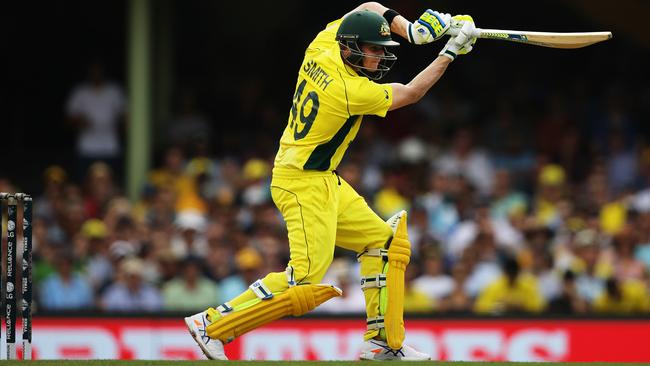
“We’re not as settled and completely certain about who fits where as, say England, or possibly India to an extent,” says three time champion Adam Gilchrist, who nonetheless believes in Finch, Warner and Smith Australia have “a core batting unit” strong enough to balance out potential deficiencies elsewhere.
“It will be a matter of working out what the best starting 11 is. They’ll be tweaks throughout the tournament.
“We start as one of the most favoured teams. We’re right up there and opponents will be fearful of that.”
NEW ZEALAND: Dark horses or genuine thoroughbreds?
PAKISTAN: Chaos as ever, but beware the ‘wounded tigers’
AFGHANISTAN: The former minnows now thinking big
SRI LANKA: Factions, frictions and a failure foretold
Feared but not outright favourites. The pressure of expectation rests on others.
Most notably England, engulfed by a sense of destiny and a narrative that stretches to them having reinvented the very nature of batting in ODIs.
Just as history gives Australian’s belief, however, will a tradition of failure hamper England when it matters?
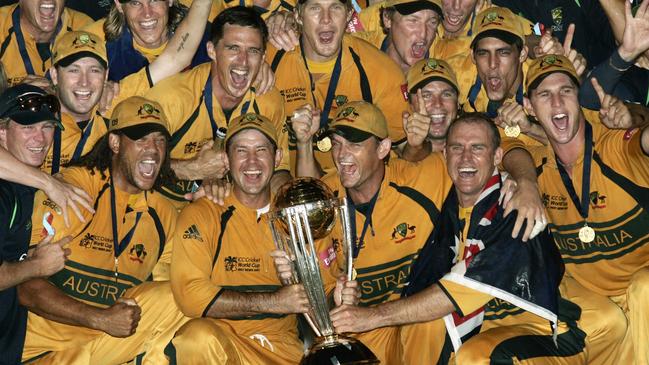
“It will be spoken about a great deal, they’ll be asked and asked and asked. And opposition teams will probably throw a few barbs in there,” says Gilchrist.
“There will be moment of truth for them, when they’ll have to front up. Do they continue with the methodology they’ve had in the last two or three years which has proved very successful and very high risk?
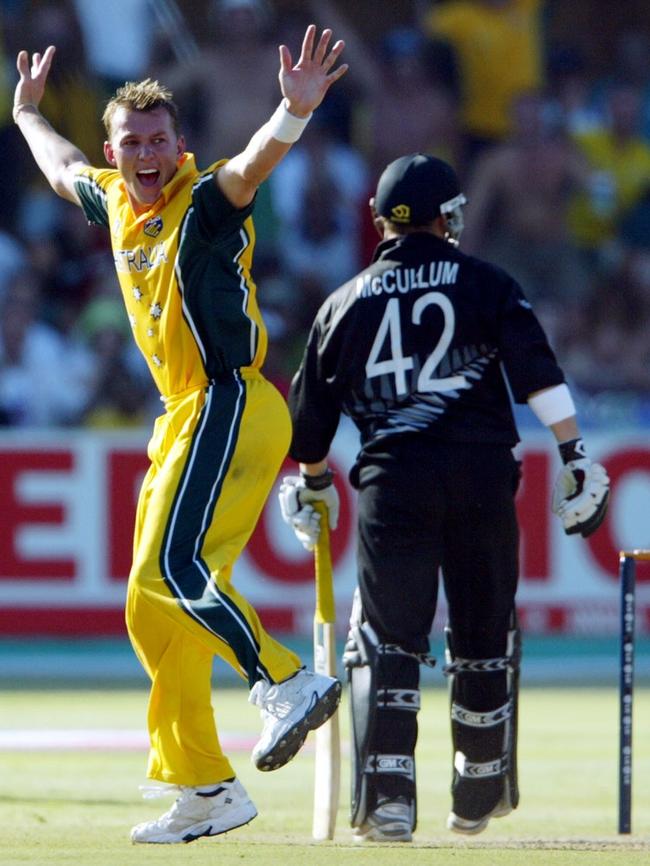
“There’ll be a moment when they’ll have to ask themselves that question: are we prepared to take this on? I suspect they will.
“Whether it’s good enough or works on the day remains to be seen.”
When news of Australia’s 242 run defeat at Trent Bridge last year — when England posted a word record 481 — was relayed to him by his son, Border thought his progeny “had been smoking hoochy coochy”.
“I thought, nah, you can’t make 480, that’s rubbish. Then he told me ‘they should have made 500 but Joe Root was rooting around …’
“There’s no secret, they’re just going to come at you hard. It’s going to be hard for the bowling group to hold their own against that onslaught.
“England is a place where [a 500 plus score] can happen.”
England’s No. 1 world status and otherworldly batting strength guarantees nothing, however.
Favourites don’t always win. Border knows that from first-hand experience, admitting it would be “telling porkie pies if you said we got on the plane convinced we were going to win (in 87)”.
Instead “strong discipline, a work ethic at training the basics” was the foundation upon which success was built.
“It sound ridiculous, like you’re an under 15 team or something, but it works,” says Border.
“It’s the first time we started to think about a specific game plan. We played a lot of one day cricket but generally speaking [before the 1987 World Cup] you just went in and played, and individual talents got you through.”
Lee, too, believes that in elite sport there is no substitute for hard work and the right mental approach.
With small boundaries and white balls with little offer of lateral movement, successful sides in England will be those who can restrict the excesses of opponents’ big hitting.
“The team that wins a World Cup is a good fielding unit,” says Lee, “because that shows they’ve trained well, they’ve prepared well, they’re hungry.
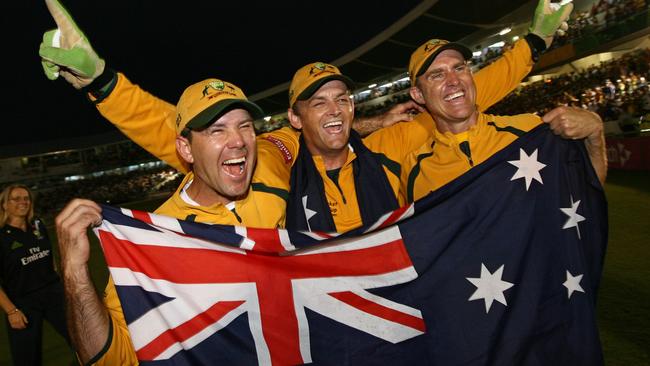
“Yes it’s good to go out and score runs and take wickets, that’s what wins you the game, but at the end of the day it’s how you present yourself as a team, too. We were a great fielding unit (in 2003), and I want the Aussies to make sure they lead from the front with their fielding.”
With Justin Langer in charge this seems a given.
“I suspect he’ll be well planned, methodical in landmarks he wants to hit and strive for and when they get to that, moving to the next one but having it broken down a little bit,” says Gilchrist of Australia’s coach.
“You’ve just got to be lowering the eyes a bit, don’t be looking at the World Cup sitting over there, look what’s in front of it first and break that down.
“That’s probably the formula we used most regularly. Just breaking down the tournament in to small stages to eventually get a chance at the ultimate goal.”
An eighth final and sixth title is there for the taking in as open a field as see at any modern World Cup. As long as Finch and Langer are able to successfully draw on the many, many lessons of the past.
Originally published as Allan Border, Brett Lee and Adam Gilchrist explain how to win a Cricket World Cup
